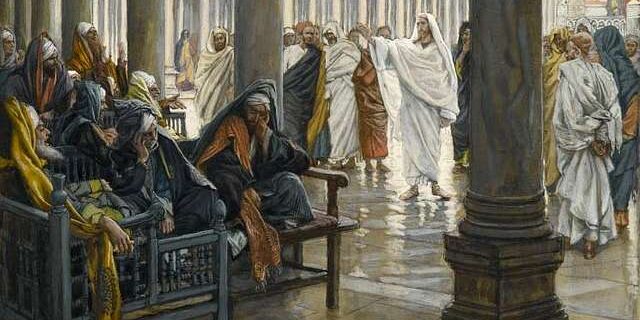Holy Tuesday commemorates the ongoing clash between Jesus and the temple authorities, begun on Holy Monday, ahead of His execution. But before that confrontation, we again encounter the allegorical fig tree, cursed the previous day for its lack of fruit, and observe the disciples’ shocked reaction.
St. Mark’s Gospel describes their astonishment as they encounter the tree once more, with St. Peter shouting, “Master, behold, the fig tree which thou cursedst is withered away.”
“How soon is the fig tree withered away!” the other marvel—granting Jesus the opportunity to explain the meaning of the curse. Have faith, He tells them, and they, too, will have the same power; even mountains will be cast in the sea by a believing prayer. By implication, the faithless—represented by the fig tree—will suffer a similar curse; the Church Fathers held it clearly represented Jerusalem’s corrupt spiritual leaders, as foreshadowed by the Book of Jeremiah in the Old Testament:
“Therefore they shall fall among those who fall;
In the time of their punishment
They shall be cast down,” says the Lord…
“No grapes shall be on the vine,
Nor figs on the fig tree,
And the leaf shall fade;
And the things I have given them shall pass away from them.”
BLIND GUIDES.
Jesus’s condemnation of Jerusalem’s leaders is all the more explicit when he returns to the temple, where he had driven out the moneychangers with a whip the previous day and began teaching.
The chief priests and elders believed they were ready to confront Him this time, challenging the authority by which He taught, and bombarding him with questions. A lengthy debate followed—from it, we have the Parable of the Two Sons, the Parable of the Tenants, the famous injunction to “Render unto Caesar the things which are Caesar’s, and unto God the things that are God’s,” and even the great commandments to “love the Lord thy God with all thy heart, and with all thy soul, and with all thy mind,” and to “love thy neighbor as thyself.”
After this, he addressed the crowds, warning them to do as the scribes and Pharisees said, but not as they do, for they did not practice what they preached, fulfilling their roles only for show.
“Woe unto you, scribes and Pharisees, hypocrites!” Jesus thundered at them. “For you shut up the kingdom of heaven against men; for you neither go in yourselves nor do you allow those who are entering to go in,” he said, calling them “Blind guides, who strain out a gnat and swallow a camel!”
“Ye serpents, ye generation of vipers, how can ye escape the damnation of hell?”
After this, He predicted His own fate—and the fate of many early Christians—by describing how the temple leaders would be sent “prophets, wise men, and scribes: some of them you will kill and crucify, and some of them you will scourge in your synagogues and persecute from city to city… Assuredly, I say to you, all these things will come upon this generation.”
Such a plot against him would come together the following day, on Spy Wednesday.


